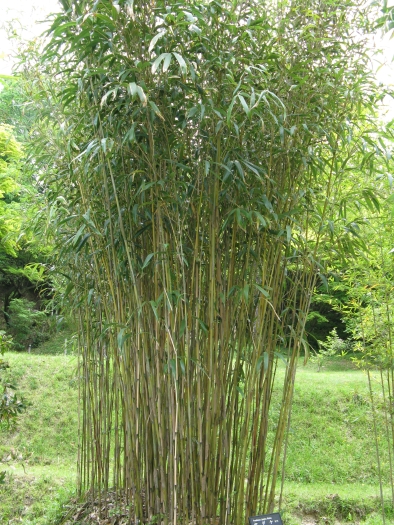Umbrella Bamboo
(Fargesia spathacea)
Umbrella Bamboo (Fargesia spathacea)
/
/

KENPEI
CC BY-SA 3.0
Image By:
KENPEI
Recorded By:
Copyright:
CC BY-SA 3.0
Copyright Notice:
Photo by: KENPEI | License Type: CC BY-SA 3.0 | License URL: http://creativecommons.org/licenses/by-sa/3.0/ | Uploader: Rotatebot | Publisher: Wikimedia Commons | Title: Pseudosasa_japonica6.jpg | Notes: * '''Description:''' Coneflower (''Isopogon cuneatus'') * '''Location:''' Australian National Botanic Gardens, Canberra, Australian Capital Territory, Australia * '''Date:''' 2005-09-21 * '''Source:''' picture taken by [[User:dlanglois|Danielle Langlois]] |

















Estimated Native Range
Summary
Fargesia spathacea, commonly known as Umbrella Bamboo, is an evergreen perennial grass native to the understory of mountainous forests and alpine regions in South and Central China. It typically grows to a height of 4-13 feet (1.2-4 meters) and forms dense clumps with a width of up to 6 feet (1.8 meters). The plant features arching canes and delicate, lance-shaped leaves that create a graceful, umbrella-like appearance. Umbrella Bamboo does not produce flowers frequently, and when it does, they are not particularly showy. However, its foliage is the main ornamental attribute.
Umbrella Bamboo is valued for its lush, evergreen foliage and its ability to form natural screens or hedges. It is often used in gardens for privacy or as a focal point in Asian-themed landscapes. This bamboo is relatively easy to maintain, as it is less invasive than many other bamboo species and does not require frequent pruning. It thrives in part shade to full sun, prefers consistently moist soil with good drainage, and is somewhat drought-tolerant once established. It is also cold-hardy, making it suitable for cultivation in a variety of climates. While it is generally disease-resistant, it can occasionally suffer from pests such as aphids or bamboo mites.CC BY-SA 4.0
Umbrella Bamboo is valued for its lush, evergreen foliage and its ability to form natural screens or hedges. It is often used in gardens for privacy or as a focal point in Asian-themed landscapes. This bamboo is relatively easy to maintain, as it is less invasive than many other bamboo species and does not require frequent pruning. It thrives in part shade to full sun, prefers consistently moist soil with good drainage, and is somewhat drought-tolerant once established. It is also cold-hardy, making it suitable for cultivation in a variety of climates. While it is generally disease-resistant, it can occasionally suffer from pests such as aphids or bamboo mites.CC BY-SA 4.0
Plant Description
- Plant Type: Grass
- Height: 8-15 feet
- Width: 3-10 feet
- Growth Rate: Moderate
- Flower Color: N/A
- Flowering Season: Spring, Summer, Fall, Winter
- Leaf Retention: Evergreen
Growth Requirements
- Sun: Part Shade
- Water: Medium
- Drainage: Slow, Medium, Fast
Common Uses
Deer Resistant, Low Maintenance
Natural Habitat
native to the understory of mountainous forests and alpine regions in South and Central China
Other Names
Common Names: Chinese Fountain Bamboo, Glansbambu, Jian Zhu
Scientific Names: , Fargesia spathacea, Thamnocalamus spathaceus, Arundinaria spathacea,
GBIF Accepted Name: Fargesia spathacea Franch.